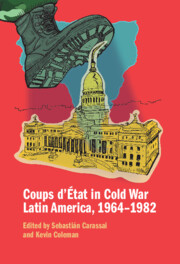Refine search
Actions for selected content:
18 results
5 - The Ruling Class
-
- Book:
- Politics as Exchange
- Published online:
- 23 October 2025
- Print publication:
- 06 November 2025, pp 71-86
-
- Chapter
- Export citation
Introduction
-
-
- Book:
- Coups d'État in Cold War Latin America, 1964–1982
- Published online:
- 24 April 2025
- Print publication:
- 08 May 2025, pp 1-22
-
- Chapter
- Export citation

Coups d'État in Cold War Latin America, 1964–1982
-
- Published online:
- 24 April 2025
- Print publication:
- 08 May 2025
33 - Consociationalism
- from Part III. A - The State
-
-
- Book:
- The Cambridge Handbook of Constitutional Theory
- Published online:
- 27 March 2025
- Print publication:
- 24 April 2025, pp 568-584
-
- Chapter
- Export citation
Chapter 6 - On Manipulation in Politics
- from Part II - The Ethics
-
- Book:
- The Concept and Ethics of Manipulation
- Published online:
- 10 April 2025
- Print publication:
- 17 April 2025, pp 197-222
-
- Chapter
- Export citation
Political Parties in African Constitutions: Expectation and Suspicion
-
- Journal:
- Journal of African Law / Volume 69 / Issue 2 / June 2025
- Published online by Cambridge University Press:
- 07 April 2025, pp. 197-212
- Print publication:
- June 2025
-
- Article
- Export citation
Chapter 12 - Hume on Economic Inequality
- from Part IV - Political Economy
-
-
- Book:
- Hume's <i>Essays</i>
- Published online:
- 02 January 2025
- Print publication:
- 09 January 2025, pp 224-246
-
- Chapter
- Export citation
18 - Futures of the African Buffalo
- from Part V - Concluding Chapters
-
-
- Book:
- Ecology and Management of the African Buffalo
- Published online:
- 09 November 2023
- Print publication:
- 23 November 2023, pp 517-548
-
- Chapter
-
- You have access
- Open access
- HTML
- Export citation
3 - Nongovernmental Organizations under Islamic Law
- from Part II - Persistent Social Atomization
-
- Book:
- Freedoms Delayed
- Published online:
- 20 July 2023
- Print publication:
- 20 July 2023, pp 47-59
-
- Chapter
- Export citation
12 - Polarization and the Making and Breaking of Governments in European Parliamentary Democracies
- from Part III - Polarization, New Cleavages, and Shifts in Democratic Government
-
-
- Book:
- Contested Representation
- Published online:
- 03 November 2022
- Print publication:
- 17 November 2022, pp 211-231
-
- Chapter
- Export citation
6 - Coordinated Coexistence
-
- Book:
- The Informal Regulation of Criminal Markets in Latin America
- Published online:
- 18 August 2022
- Print publication:
- 25 August 2022, pp 160-193
-
- Chapter
- Export citation
7 - Concluding Reflections
-
- Book:
- Law as an Instrument
- Published online:
- 07 July 2022
- Print publication:
- 21 July 2022, pp 162-180
-
- Chapter
- Export citation
5 - Stability and Obedience
-
- Book:
- Aristotle and Law
- Published online:
- 28 November 2019
- Print publication:
- 19 December 2019, pp 109-128
-
- Chapter
- Export citation
When Things Get Personal: How Informal and Personalized Politics Produce Regime Stability in Small States
- Part of
-
- Journal:
- Government and Opposition / Volume 55 / Issue 3 / July 2020
- Published online by Cambridge University Press:
- 10 October 2018, pp. 393-412
-
- Article
-
- You have access
- HTML
- Export citation
The stability of basic income: a constitutional solution for a political problem?
-
- Journal:
- Journal of Public Policy / Volume 36 / Issue 4 / December 2016
- Published online by Cambridge University Press:
- 21 July 2015, pp. 521-545
-
- Article
- Export citation
7 - Commerce and Trade
- from PART II - ECONOMIC AND SOCIAL DEVELOPMENTS
-
-
- Book:
- The New Cambridge Medieval History
- Published online:
- 28 March 2008
- Print publication:
- 18 June 1998, pp 145-160
-
- Chapter
- Export citation
17 - Germany and the Empire
- from PART IV - THE DEVELOPMENT OF EUROPEAN STATES
-
-
- Book:
- The New Cambridge Medieval History
- Published online:
- 28 March 2008
- Print publication:
- 18 June 1998, pp 335-366
-
- Chapter
- Export citation
(a) - Lancastrian England
- from 21 - England
-
-
- Book:
- The New Cambridge Medieval History
- Published online:
- 28 March 2008
- Print publication:
- 18 June 1998, pp 457-476
-
- Chapter
- Export citation
